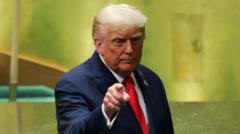Is Trump's UN Speech a Bold Trumpism or Just Unhinged?

Published: 2025-09-23 20:10:15 | Category: technology
Donald Trump's speech to the United Nations illustrated his distinct worldview and political ideology, often termed "Trumpism." His remarks, which were divisive yet revealing, drew a mix of admiration and criticism, showcasing his views on the effectiveness of the UN, immigration policies, and energy strategies in Europe. This article explores the key themes and implications of Trump's address, providing context and insights into its potential impact on international relations.
Last updated: 27 October 2023 (BST)
Key Takeaways from Trump's UN Speech
- Trump praised the US, claiming it is in a "golden age" and that he ended seven wars.
- He criticised the UN for its ineffectiveness, particularly in conflict resolution and immigration policies.
- Trump expressed concern over Europe's immigration policies and reliance on renewable energy.
- He warned European nations against purchasing Russian energy amidst the ongoing Ukraine conflict.
- Trump's bold statements about Ukraine suggest a shift in his stance towards Russia.
Trump's Vision of a "Golden Age"
In his speech, Trump began by asserting that the United States is currently experiencing a "golden age." He reiterated his claim of having ended seven wars, suggesting that such achievements warrant recognition, including a Nobel Peace Prize. This self-congratulatory stance is typical of Trump's approach, as he often intertwines national pride with personal accolades.
Critique of the United Nations
One of the most significant aspects of Trump's speech was his pointed criticism of the United Nations. He argued that the UN has not effectively contributed to peace-making, stating that its initiatives often result in "strongly worded letters" that yield no tangible outcomes. This perspective resonates with many who believe that the UN has become mired in bureaucracy and ineffective in addressing global crises.
Trump specifically addressed the UN's role in aiding asylum seekers, claiming that it "creates invasions" rather than preventing them. His remarks reflect a broader scepticism about global institutions, suggesting a preference for unilateral over multilateral action in international relations.
The European Landscape: Immigration and Energy Policies
Trump directed harsh criticism towards European countries, particularly regarding their immigration policies and investments in renewable energy sources. He claimed that Europe is facing a crisis due to "illegal aliens" and described the continent as being "invaded." His characterisation of immigration as a threat ties into his broader narrative of nationalism and the preservation of cultural identity.
Moreover, Trump condemned European nations for their energy policies, labelling the transition to renewable energy as "suicidal." He argued that such policies would lead to economic decline and suggested that countries should abandon what he termed the "green energy scam." This viewpoint starkly contrasts with the increasing commitment of many European governments to combat climate change through sustainable practices.
Trump's Stance on Russia and Ukraine
Another critical component of Trump's address was his commentary on the ongoing conflict between Russia and Ukraine. He stated that President Putin's refusal to cease hostilities was damaging Russia's image and warned of "very strong" tariffs to pressure an end to the conflict. Trump's statement about European countries continuing to buy Russian energy, despite the war, highlights a potential inconsistency in his approach to sanctions and international pressure.
Interestingly, Trump characterised Russia as a "paper tiger," suggesting it lacks the military power it projects. This comment may be seen as an attempt to bolster Ukraine's morale, as he optimistically claimed that the country could reclaim its territory with the support of the EU and NATO. However, his omission of US involvement raises questions about his commitment to Ukraine's defence.
Rethinking Multilateralism
Trump's speech underscores a broader critique of multilateralism, where he seemingly advocates for a world where powerful nations, led by strong leaders like himself, negotiate directly rather than through international institutions. This approach may resonate with supporters who favour a more assertive American foreign policy but raises concerns about the future of global cooperation.
Many analysts argue that Trump's disdain for the UN and other multilateral organisations reflects not only his ideology but also a growing trend among certain political leaders worldwide. The implication is that global challenges, such as climate change and international conflict, may require cooperative efforts that Trump’s vision fundamentally undermines.
Implications for International Relations
The ramifications of Trump's speech extend beyond rhetoric; they could influence the trajectory of US foreign policy and its relationships with other nations. His focus on nationalism and scepticism towards international collaboration might lead to increased tensions with traditional allies and a shift towards more isolationist policies.
Furthermore, Trump's comments on energy policies in Europe could exacerbate divisions among NATO members, particularly as they navigate the complex landscape of energy security and climate commitments. His remarks may embolden populist movements within Europe that share similar views on immigration and national sovereignty.
Conclusion: The Future of Trump's Ideology
Ultimately, Trump's address at the United Nations serves as a stark reminder of his brand of politics—a blend of nationalism, scepticism towards global institutions, and a focus on direct negotiations among powerful leaders. The speech was a clear articulation of his worldview, which may appeal to his base but also raises significant challenges for international diplomacy and cooperation. As the global landscape evolves, the question remains: how will Trump's ideology shape future interactions on the world stage?
#TrumpUNSpeech #GlobalPolitics #InternationalRelations
FAQs
What were the main themes of Trump's speech at the UN?
Trump's speech highlighted themes of nationalism, a critique of the UN's effectiveness, concerns over European immigration and energy policies, and a focus on strong bilateral negotiations rather than multilateral cooperation.
How did Trump view the United Nations?
Trump expressed dissatisfaction with the UN, arguing it fails to resolve conflicts effectively and instead engages in empty rhetoric. He suggested that the organisation's role in assisting asylum seekers undermines its purpose.
What did Trump say about Europe and immigration?
Trump claimed that Europe is facing an "invasion" of illegal immigrants and warned that its policies on immigration and renewable energy could lead to severe economic and cultural decline.
What was Trump's stance on Russia's war in Ukraine?
Trump stated that Russia's actions are damaging its reputation and warned European nations against purchasing Russian energy. He also optimistically suggested that Ukraine could regain its territory with support from the EU and NATO.
What is the significance of Trump's speech for future US foreign policy?
The speech highlights a potential shift towards a more isolationist and nationalist US foreign policy, which could strain relationships with traditional allies and undermine global cooperation on pressing issues.



